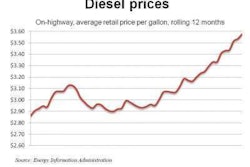During the recent Technology and Maintenance Council Annual Meeting, Al Cohn, director of new market development and engineering support for Pressure Systems International, organized and moderated a roundtable discussion focusing on Tire Inflation Pressure Technologies as part of the S.2 Tire and Wheel Study Group.
Presented at the session were results from a recent 12-month fleet field test conducted by the Federal Motor Carrier Safety Administration to determine whether tire pressure monitoring systems and automatic tire inflation systems can influence tire maintenance intervals and practices and improve performance and safety.
Chris Flanigan, FMCSA Office of Analysis, Research and Technology, commented on each of the hypotheses the agency aimed to prove or disprove with their field test that was based on data collected from two fleet operations by Sheetz and Gordon Food Services, both outfitted with the Meritor Tire Inflation System by PSI, Tire SafeGuard Monitoring System from HCI Corp. and Integrated Vehicle Tire Monitoring System from Wabco:
• Hypothesis 1: TPMS or ATIS use will increase the life of equipped tires. Comment: GFS tire wear data points toward increased tire life;
• Hypothesis 2: TPMS or ATIS use will improve fuel economy of equipped tractor-trailers. Comment: Fleets saw a 1.4 percent improvement in fuel economy;
• Hypothesis 3: TPMS or ATIS use will reduce road calls for damaged/flat tires of equipped tractor-trailers. Comment: Test fleets experience fewer road calls;
• Hypothesis 4: TPMS or ATIS correctly measures the tire pressure of equipped tractor-trailers. Comment: Minor issues were identified in each fleet; and
• Hypothesis 5: TPMS or ATIS use will not introduce unscheduled maintenance that adversely affects day-to-day fleet operations. Comment: Technicians did not report altered work habits due to TPMS equipment.
“We organized the session because improper inflation is a significant contributing factor to the number one maintenance cost for fleets – tires.” Cohn says. Increasing government regulations with Compliance Safety and Accountability, the California Air Resources Board, U.S. Environmental Protection Agency’s SmartWay, CAFÉ standards and the TREAD Act also are playing an important role, Cohn says.
Other panel members included Peggy Fisher, president, TireStamp; Frank Sonzala, executive vice president, Pressure Systems International; Mike Jeffress, vice president of maintenance, Maverick Transportation; and Winston Minchew, asset and training manager, Old Dominion Freight Line Inc.












